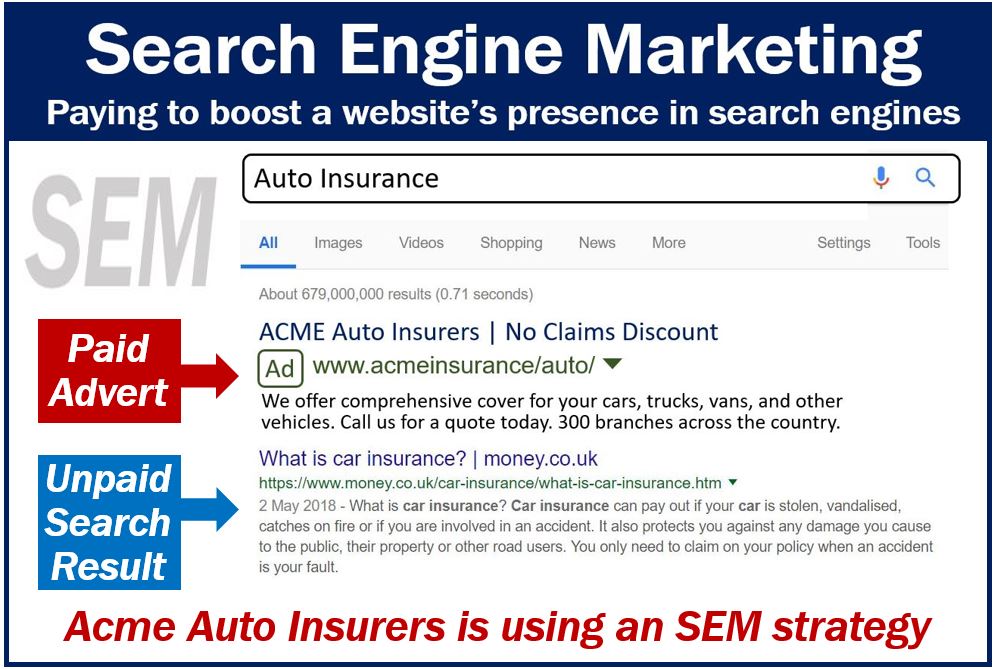Search Engine Marketing is a type of Internet marketing that tries to increase a website’s visibility in search engines. Today, the term mostly refers to gaining website traffic and exposure through paid advertising. The abbreviated form, SEM, is also a common term (pronounce each letter separately).
Internet marketing refers to marketing efforts that businesses and other organizations do solely over the Internet.
With search engine marketing, businesses pay for their adverts to appear alongside search queries in search engines. Google, Yahoo, Safari, and Bing, for example, are search engines.
Wordstream says the following about SEM:
“Search engine marketing’s greatest strength is that it offers advertisers the opportunity to put their ads in front of motivated customers who are ready to buy at the precise moment they’re ready to make a purchase.”
“No other advertising medium can do this, which is why search engine marketing is so effective and such an amazingly powerful way to grow your business.”

Search engine marketing vs. search engine optimization
Search engine marketing used to be an umbrella term that also encompassed search engine optimization or SEO. Over time, however, SEO grew and is today a completely separate marketing field.
Some marketing people today still say that SEO is a part of SEM.
-
What is search engine optimization?
Like SEM, the aim in SEO is to boost your website’s or webpages appearance in search engines. However, unlike SEM, the SEO marketer does not pay for it.
In the world of business, especially hi-tech and the Internet, when something grows naturally, we say it grows ‘organically.’ Therefore, SEO refers to boosting your website’s presence in search engines organically. In other words, naturally, i.e., not having to pay for it.
Experts say that for effective SEO, websites must focus on excellent content, lots of inbound links from respectable websites, outbound links, and the effective use of keywords and key phrases.
-
What is search engine marketing?
Search engine marketing is a form of Internet marketing in which the marketer uses paid advertising. Google is, by far, the most popular search engine for search engine marketing.
In the second quarter of 2015, Google received 73.7% of all the money that companies and people spent on search engine advertising. Yahoo/Bling came second.
Google AdWords is probably the most popular search engine marketing platform. Bing Ads is also another prominent SEM platform, as are Yahoo! Gemini and IgnitionOne.
Which is better – SEO or SEM?
Search engine optimization takes much longer to produce desired results than search engine marketing. It can take several months and even years. How long depends on several factors, including how many competitors there are in the market, and how effective your SEO strategy has been. The age of your website is also a factor.
Search engine marketing gets results much faster. If you pay for ads on, for example, search results in search engines, you should see immediate results. In other words, your website traffic should receive a boost straight away.
While SEM offers immediate visibility, it’s important to note that this form of marketing requires continuous investment; the moment you stop paying for ads, the visibility and traffic gained from SEM campaigns can rapidly diminish.
However, purists might argue that SEM does not tell you how good your website is. If your growth is 100% organic, you know that what you are doing to your website boosts growth. If you pay for advertising, how can you know whether what you are doing in your webpages is improving the site?
The risk of spending a lot of money on search engine marketing is that as soon as the adverts stop, traffic crashes. With an SEO approach, you do not have this risk.
Furthermore, a balanced approach combining both SEM and SEO strategies can provide both immediate visibility and long-term organic growth, leveraging the strengths of each method for a more robust online presence.
If you cannot wait for the growth and you have a lot of money, SEM is a useful option.
Compound phrases with ‘search engine’
There are many compound phrases containing the term ‘search engine.’ Let’s have a look at some common ones:
-
Search Engine Crawlers
Programs used by search engines to systematically browse the web and index website content for search results. As in:
“To ensure the latest content updates are indexed, website administrators often optimize their sites for search engine crawlers.”
-
Search Engine Guidelines
Rules or best practices set by search engines for website owners to follow for better indexing and ranking. As in:
“Adhering to search engine guidelines is essential for maintaining a website’s visibility and ranking in search results.”
-
Search Engine Submission
The process of submitting a website directly to a search engine to request indexing or re-indexing. As in:
“New websites can benefit from search engine submission to speed up the indexing process by search engines.”
-
Search Engine Analytics
Tools or software used to analyze and monitor a website’s performance in search engine results. As in:
“By using search engine analytics, marketers can track which keywords are driving traffic to their site.”
-
Search Engine Penalties
Sanctions or negative impacts on a website’s search rankings, typically resulting from violating search engine guidelines. As in
“The website’s ranking dropped significantly due to search engine penalties incurred from using black-hat SEO techniques.”
Two Videos
These two interesting video presentations, from our sister YouTube channel – Marketing Business Network, explain what ‘Search Engine Marketing’ and ‘A Search Engine’ are using simple, straightforward, and easy-to-understand language and examples.
-
What is Search Engine Marketing?
-
What is a Search Engine?
